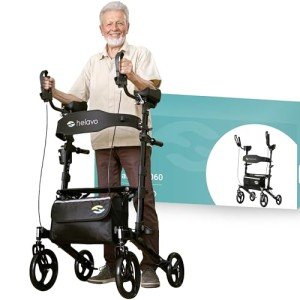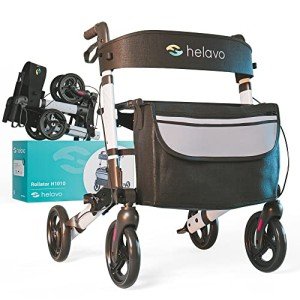You'll Never Guess This Rollator For Seniors's Tricks
페이지 정보

본문

Understanding Rollators for Seniors: A Comprehensive Guide
As people age, preserving mobility and self-reliance ends up being increasingly important. One tool that has transformed senior mobility is the rollator. More than just a walking aid, rollators supply stability, support, and even a place to rest, enabling seniors to browse their environments with confidence. In this extensive guide, we will analyze what a rollator is, its advantages, types, features, and crucial factors to consider for purchase. In addition, we will address some often asked questions to assist readers make notified decisions.
What is a Rollator?
A rollator is a kind of wheeled walker equipped with 3 or four wheels, hand brakes, and a seat. Unlike basic walkers, which require the user to lift them with each action, rollators enable users to press the walker while walking, supplying more support and stability. They are specifically designed for individuals who may have balance problems and need assistance navigating without compromising independence.
Advantages of Using a Rollator
The advantages of utilizing a rollator for seniors are many. Here are some key benefits:
- Enhanced Mobility: Rollators permit seniors to walk more with confidence and easily without the need to completely depend on others for support.
- Benefit: With integrated seats, users can take a break whenever they require to, consequently lowering tiredness during trips or errands.
- Safety Features: Many rollators featured handbrakes that permit users to stop and secure the walker in place, decreasing the risk of falls.
- Storage Options: Some rollators come geared up with storage compartments or baskets, making it easier to bring personal products like handbags, groceries, or medical materials.
Types of Rollators
Rollators come in different models tailored to various needs and choices. Here's a breakdown of the most typical types:
| Type of Rollator | Description | Ideal for |
|---|---|---|
| Standard Rollator | Normally features 4 wheels and a comfortable seat for resting. | The majority of seniors needing basic support. |
| Indoor Walker Rollator | Created for use inside the home, with slimmer frames for maneuverability. | Seniors needing to navigate tight areas. |
| Heavy-Duty Walker Rollator | Constructed with a more powerful frame to support greater weight capacities. | Bigger individuals who need tough support. |
| Lightweight Rollator | Made from lightweight products for easy transport and handling. | Seniors who take a trip regularly or require to lift the rollator. |
| Rollator with Seat | Features a seat incorporated into the frame, offering a resting alternative. | Seniors who might tire quickly or delight in longer strolls. |
| Three-Wheel Rollator | Deals maneuverability and is developed for tight areas. | Seniors needing to navigate little locations. |
| Rollators with Accessories | Equipped with trays, baskets, or umbrellas for included benefit. | Seniors seeking extra performance. |
Features to Consider When Buying a Rollator
When picking a rollator, numerous features can enhance the experience for seniors. Here's a list of vital features and factors to consider:
Weight Capacity
- Guarantee the rollator can support the user's weight easily.
Seat Height
- The seat must be at a comfortable height for the user, enabling easy gain access to.
Manage Height Adjustability
- Look for rollators with adjustable handles so that users can find their ideal height.
Brakes
- Hand brakes need to be Easy Maneuver Walker to engage and disengage, and they need to lock securely.
Wheels
- Bigger wheels can handle uneven outdoor surfaces better than smaller sized ones.
Frame Material
- Lightweight frames are simpler to maneuver, particularly for seniors with lowered strength.
Mobility
- Foldable Rollator Walker rollators are much easier to store or transport in a cars and truck.
Storage Options
- Look for baskets or trays for carrying items, enhancing functionality during getaways.
Devices
- Some rollators come with added devices like bags, cup holders, or even a flashlight, which can boost usability.
Design and Color
- Visual preference is likewise important; choosing a rollator that interest the user can make a substantial difference in motivating routine use.
Frequently Asked Questions (FAQ)
Q1: Who should use a rollator?
- Rollators are ideal for individuals who have difficulty walking due to age, injury, or medical conditions such as arthritis or post-surgery healing.
Q2: How much do rollators generally cost?
- Rates for rollators can vary commonly, from around ₤ 70 to over ₤ 300, depending on features, materials, and brand.
Q3: Can rollators be utilized outdoors?
- Yes, lots of rollators are designed for both indoor and outdoor use. Look for designs with bigger wheels for Outdoor Walker navigation.
Q4: Are rollators adjustable?
- Most rollators have adjustable deals with and seat heights to accommodate different user sizes and preferences.
Q5: Do I require a prescription to purchase a rollator?
- Typically, a prescription is not needed to buy a rollator. Nevertheless, talking to a health care provider can use individualized recommendations.
Using a rollator can substantially enhance the quality of life for seniors, enhancing their mobility while promoting independence. When picking the ideal rollator, consider aspects such as weight capacity, height adjustability, and additional features to discover the perfect match. With the right rollator, seniors can delight in higher liberty, confidence, and comfort in their day-to-day lives. Whether for a walk in the park or running errands, a rollator might extremely well be the key to maintaining an active way of life as one ages.

- 이전글How A Weekly Ready To Install Bay Windows Project Can Change Your Life 25.10.20
- 다음글8 Undeniable Facts About Call Girls In Accra 25.10.20
댓글목록
등록된 댓글이 없습니다.
